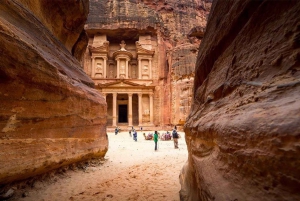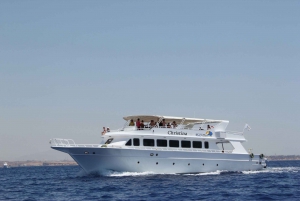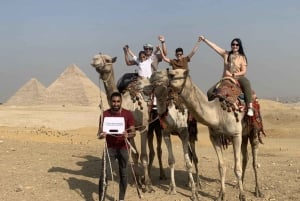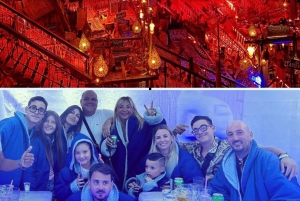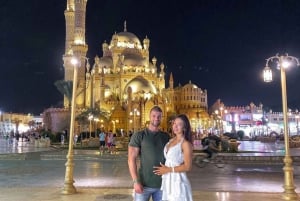Local Holidays
Egypt’s Holidays & Festivals
Egypt is a wondrous country with many festivals and celebrations. Some festivals are historic, some are secular and some are religious.
Sham El-Nessim:
Both Muslims and Christians in Egypt welcome the first day of spring with a festive picnic called Sham al-Naseem, which means "the smell of spring". On the twenty-first of March, the people gather for outdoor picnics. "Midamis" (kidney beans) and "Fisikh" (dried fish) are the traditional food of the day.
It comes immediately after Easter; so, it always occurs on Monday. Egyptians have been celebrating Sham El-Nessim for more than 4500 years. It is called Sham El-Nessim because the harvest season in ancient Egypt was called "Shamo".
In Arabic, Sham means smell and El-Nessim means air. In ancient Egypt, Egyptians used to offer salted fish, lettuce and onion to Egyptian deities in this festivity. The same kinds of food are still eaten in Egypt on this day, as a tradition giving the day a special taste. Lettuce represents the feeling of hopefulness at the beginning of spring. As for eggs, they symbolize the renewal of life in this season.
Many people dye eggs in delightful colors. It is believed that ancient Egyptians were the first to practice this habit. Salted fishes are also eaten on this day because they symbolize fertility and welfare.
Egyptian Christmas:
For the Coptic Christians of Egypt, Christmas is celebrated on January 7th each year.
The Christmas season marks a time of fasting and vegetarianism for the community, and no meat or milk is taken from November 25th to the night of January 6th. Churches and Christian homes are festooned with lights, Christmas trees and manger scenes in the week leading up to Christmas, and on Christmas Eve, the 6th of January, celebrations in churches are held and the bells of the churches ring out. The Pope of the Orthodox Church begins prayers at the big Cathedral in Cairo at 11 p.m., and this service is broadcasted on Egyptian television.
Christmas Day marks the end of fasting and picnics on the Nile are common places for celebrations. Children are given El 'aidia, the feast gift, to buy toys or sweets such as ice cream or sugar cane juice.
Revolution Day:
Revolution day is July 23, Egypt's National Holiday. It celebrates revolution which occurred in 1952.
Mulid El Naby (Prophet Muhammad's Birthday):
It is an Islamic holiday which is celebrated according to the Islamic lunar calendar. Mulid El Nabawy means the birthday of the prophet. It is celebrated by making special candies and selling them in the streets and at candies stores. The candies are pink and are usually under the shape of a horse or a doll. People wear their best clothes and families get together to celebrate this day. Decorations are found on the streets and on buildings. Mulid El Nabawy is the equivalent of Christmas.
Ramadan:
Ramadan is the ninth month of the Muslim calendar. It is during this month that Muslims observe the Fast of Ramadan. Lasting for the entire month, Muslims fast during the daylight hours and in the evening eat small meals and visit with friends and family. It is a time of worship and contemplation.
Armed Forces Day:
It is on October 6. It is the celebration of the Egyptian army's crossing into Sinai in 1973.
Eid-al-Adha:
It is the second important holiday which celebrates the Prophet Abraham's willingness to offer his son for sacrifice .It is a four days holiday, on the first day at dawn all men, (and women if they want to), and go to the mosque to pray. . It is at this time that Muslims will have a sheep or goat slaughtered to feed the poor and needy. Every family slaughter a sheep, which they have already bought, and take some of its meat and donate the majority of the meat to the poor. Then they have a late breakfast which includes "Fata". "Fata" is formed of meat, bread, rice and vinegar. Then the young families visit the grandparents and relatives then they all gather at the eldest of the family and have lunch.
Sinai Liberation Day:
It is celebrated in Egypt every year on 25th April. It commemorates the withdrawal in 1982 of the last Osraeli troops from the Sinai peninsula, which it had occupied since the 1967 six-Day war. The withdrawal of troops was carried out in accordance with the terms of the 1979 peace treaty drawn up between Egypt and Israel following the camp David accords.
Eid El Fitr:
It comes after Ramadan.. People eat special cookies. This holiday is for the Muslim Egyptians. It is a three days holiday, on the first day at dawn all men, (and women if they want to), go to the mosque to pray. and usually you are invited to lunch at uncles, aunts, or friends.
Labor Day:
May 1st is a national holiday in Egypt. It is a first day of the month of May. Most countries celebrate Labor Day in May and some countries celebrate in different dates. Labour Day is an important event of the workers to commemorate the contribution to society of all working people. Labor Day celebrates on May 1st of every year. Labour Day is honoring the labor. It is a memorial or reminder of the Workers' Movement. It celebrates the economic and social achievements of workers. This is day is commemorated to the mark the contribution of the labor union for the eight hour day movement which advocated eight hours for work, eight hours for recreation, and eight hours for rest. Most people know this day as International Workers' Day or May Day.


